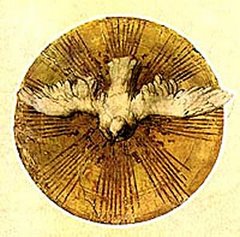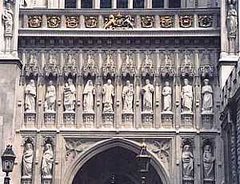
Descent of the Holy Spirit
Son of God

Rose window, Notre Dame, Paris
The Virgin Mary

Shield of St. Peter
The Primacy of Peter
Matthew to Revelation - Peter is mentioned 155 times and the rest of apostles combined are only mentioned 130 times. Peter is also always listed first except in 1 Corinthians 3:22 and Galatians 2:9 (which are obvious exceptions to the rule).
Matthw 10:2; Mark 1:36; 3:16; Luke 6:14-16; Acts 1:3; 2:37; 5:29 - these are some of many examples where Peter is mentioned first among the apostles.
Matthew 14:28-29 - only Peter has the faith to walk on water. No other man in Scripture is said to have the faith to walk on water. This faith ultimately did not fail.
Matthew 16:16, Mark 8:29; John 6:69 - Peter is first among the apostles to confess the divinity of Christ.
Matthew 16:17 - Peter alone is told he has received divine knowledge by a special revelation from God the Father.
Matthew 16:18 - Jesus builds the Church only on Peter, the rock, with the other apostles as the foundation and Jesus as the Head.
Matthew 16:19 - only Peter receives the keys to the Kingdom.
Matthew 17:24-27 - the tax collector approaches Peter for Jesus' tax. Peter is the spokesman for Jesus.
Matthew 18:21 - in the presence of the disciples, Peter asks Jesus about the rule of forgiveness. One of many examples where Peter takes a leadership role among the apostles in understanding Jesus' teachings.
Matt. 19:27 - Peter speaks on behalf of the apostles by telling Jesus that they have left everything to follow Him.
Mark 10:28 - here also, Peter speaks on behalf of the disciples by declaring that they have left everything to follow Him.
Mark 11:21 - Peter speaks on behalf of the disciples in remembering Jesus' curse on the fig tree.
Mark 14:37 - at Gethsemane, Jesus asks Peter, and no one else, why he was asleep. Peter is accountable to Jesus for his actions on behalf of the apostles because he has been appointed by Jesus as their leader.
Mark 16:7 - Peter is specified by an angel as the leader of the apostles as the angel confirms the resurrection of Christ.
Luke 5:4,10 - Jesus instructs Peter to let down the nets for a catch, and the miraculous catch follows. Peter, metaphorically, is the "fisher of men."
Luke 7:40-50- Jesus addresses Peter regarding the rule of forgiveness and Peter answers on behalf of the disciples. Jesus also singles Peter out and judges his conduct vis-à-vis the conduct of the woman who anointed Him.
Luke 8:45 - when Jesus asked who touched His garment, it is Peter who answers on behalf of the disciples.
Luke 8:51; 9:28; 22:8; Acts 1:13; 3:1,3,11; 4:13,19; 8:14 - Peter is always mentioned before John, the disciple whom Jesus loved.
Luke 9:28;33 - Peter is mentioned first as going to mountain of transfiguration and the only one to speak at the transfiguration.
Luke 12:41 - Peter seeks clarification of a parable on behalf on the disciples. This is part of Peter's formation as the chief shepherd of the flock after Jesus ascended into heaven.
Luke 22:31-32 - Jesus prays for Peter alone, that his faith may not fail, and charges him to strengthen the rest of the apostles.
Luke 24:12, John 20:4-6 - John arrived at the tomb first but stopped and waited for Peter. Peter then arrived and entered the tomb first.
John 6:68 - after the disciples leave, Peter is the first to speak and confess his belief in Christ after the Eucharistic discourse.
John 13:6-9 - Peter speaks out to the Lord in front of the apostles concerning the washing of feet.
John 13:36; 21:18 - Jesus predicts Peter's death. Peter was martyred at Rome in 67 A.D.
John 21:2-3,11 - Peter leads the fishing and his net does not break. The boat (the "barque of Peter") is a metaphor for the Church.
John 21:7 - only Peter got out of the boat and ran to the shore to meet Jesus. Peter is the earthly shepherd leading us to God.
John 21:15 - in front of the apostles, Jesus asks Peter if he loves Jesus "more than these," which refers to the other apostles.
John 21:15-17 - Jesus charges Peter to "feed my lambs," "tend my sheep," "feed my sheep." Sheep means all people, even the apostles.
Acts 1:13 - Peter is first when entering upper room after our Lord's ascension. The first Eucharist and Pentecost were given in this room.
Acts 1:15 - Peter initiates the selection of a successor to Judas right after Jesus ascended into heaven, and no one questions him.
Acts 2:14 - Peter is first to speak for the apostles after the Holy Spirit descended upon them at Pentecost. Peter is the first to preach the Gospel.
Acts 2:38 - Peter gives first preaching in the early Church on repentance and baptism in the name of Jesus Christ.
Acts 3:1,3,4 - Peter is mentioned first as going to the Temple to pray.
Acts 3:6-7 - Peter works the first healing of the apostles.
Acts 3:12-26, 4:8-12 - Peter teaches the early Church the healing through Jesus and that there is no salvation other than Christ.
Acts 5:3 - Peter declares the first anathema of Ananias and Sapphira which is ratified by God, and brings about their death. Peter exercises his binding authority.
Acts 5:15 - Peter's shadow has healing power. No other apostle is said to have this power.
Acts 8:20-23 - Peter casts judgment on Simon's quest for gaining authority through the laying on of hands. Peter exercises his binding and loosing authority.
Acts 9:32-34 - Peter is mentioned first among the apostles and works the healing of Aeneas.
Acts 9:38-40 - Peter is mentioned first among the apostles and raises Tabitha from the dead.
Acts 10:5 - Cornelius is told by an angel to call upon Peter. Angels are messengers of God. Peter was granted this divine vision.
Acts 10:34-48, 11:1-18 - Peter is first to teach about salvation for all (Jews and Gentiles).
Acts 12:5 - this verse implies that the "whole Church" offered "earnest prayers" for Peter, their leader, during his imprisonment.
Acts 12:6-11 - Peter is freed from jail by an angel. He is the first object of divine intervention in the early Church.
Acts 15:7-12 - Peter resolves the first doctrinal issue on circumcision at the Church's first council at Jerusalem, and no one questions him. After Peter spoke, all were kept silent.
Acts 15:12 - only after Peter speaks do Paul and Barnabas speak in support of Peter's definitive teaching.
Acts 15:13-14 - then James speaks to further acknowledge Peter's definitive teaching. "Simeon (Peter) has related how God first visited..."
(www.scripturecatholic.com)
Shield of St. Paul




